-
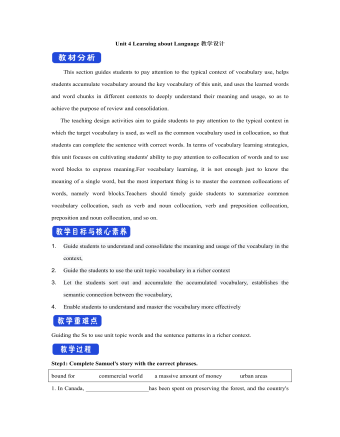
新人教版高中英语选修2Unit 4 Learning about Language教学设计
This section guides students to pay attention to the typical context of vocabulary use, helps students accumulate vocabulary around the key vocabulary of this unit, and uses the learned words and word chunks in different contexts to deeply understand their meaning and usage, so as to achieve the purpose of review and consolidation.The teaching design activities aim to guide students to pay attention to the typical context in which the target vocabulary is used, as well as the common vocabulary used in collocation, so that students can complete the sentence with correct words. In terms of vocabulary learning strategies, this unit focuses on cultivating students' ability to pay attention to collocation of words and to use word blocks to express meaning.For vocabulary learning, it is not enough just to know the meaning of a single word, but the most important thing is to master the common collocations of words, namely word blocks.Teachers should timely guide students to summarize common vocabulary collocation, such as verb and noun collocation, verb and preposition collocation, preposition and noun collocation, and so on.1. Guide students to understand and consolidate the meaning and usage of the vocabulary in the context, 2. Guide the students to use the unit topic vocabulary in a richer context3. Let the students sort out and accumulate the accumulated vocabulary, establishes the semantic connection between the vocabulary,4. Enable students to understand and master the vocabulary more effectivelyGuiding the Ss to use unit topic words and the sentence patterns in a richer context.
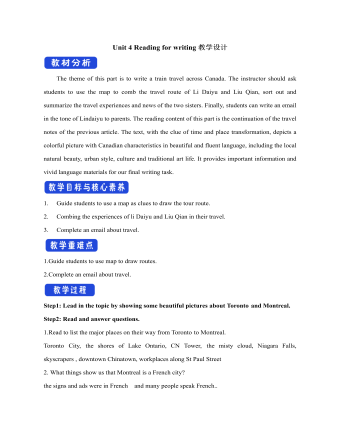
新人教版高中英语选修2Unit 4 Reading for writing教学设计
假定你是英国的Jack,打算来中国旅行,请你给你的中国笔友李华写一封信,要点如下:1.你的旅行计划:北京→泰山→杭州;2.征求建议并询问他是否愿意充当你的导游。注意:1.词数80左右(开头和结尾已给出,不计入总词数);2.可以适当增加细节,以使行文连贯。参考词汇:故宫 the Forbidden City;泰山 Mount TaiDear Li Hua,I'm glad to tell you that 'm going to visit China.First,I am planning to visit Beijing,the capitalof China,where I am looking forward to enjoying the Great Wall,the Forbidden City and somebeautiful parks.Then I intend to go to visit Mount Tai in Shandong Province.I've heard that it is one ofthe most famous mountains in China and I can't wait to enjoy the amazing sunrise there.After that,I amalso going to Hangzhou.It is said that it is a beautiful modern city with breathtaking natural sights,among which the West Lake is a well- known tourist attraction.What do you think of my travel plan? Will you act as my guide? Hope to hear from you soon.
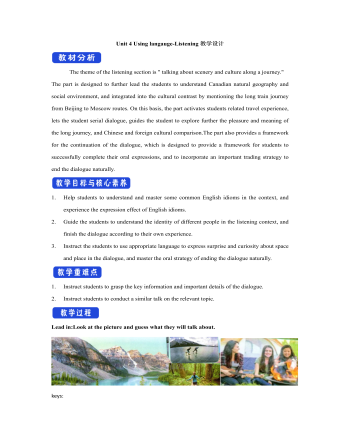
新人教版高中英语选修2Unit 4 Using langauge-Listening教学设计
The theme of the listening section is " talking about scenery and culture along a journey."The part is designed to further lead the students to understand Canadian natural geography and social environment, and integrated into the cultural contrast by mentioning the long train journey from Beijing to Moscow routes. On this basis, the part activates students related travel experience, lets the student serial dialogue, guides the student to explore further the pleasure and meaning of the long journey, and Chinese and foreign cultural comparison.The part also provides a framework for the continuation of the dialogue, which is designed to provide a framework for students to successfully complete their oral expressions, and to incorporate an important trading strategy to end the dialogue naturally.1. Help students to understand and master some common English idioms in the context, and experience the expression effect of English idioms.2. Guide the students to understand the identity of different people in the listening context, and finish the dialogue according to their own experience.3. Instruct the students to use appropriate language to express surprise and curiosity about space and place in the dialogue, and master the oral strategy of ending the dialogue naturally.1. Instruct students to grasp the key information and important details of the dialogue.2. Instruct students to conduct a similar talk on the relevant topic.
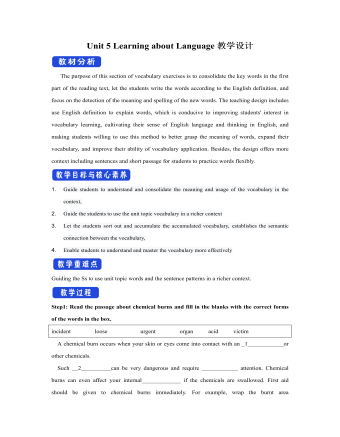
新人教版高中英语选修2Unit 5 Learning about Language教学设计
The purpose of this section of vocabulary exercises is to consolidate the key words in the first part of the reading text, let the students write the words according to the English definition, and focus on the detection of the meaning and spelling of the new words. The teaching design includes use English definition to explain words, which is conducive to improving students' interest in vocabulary learning, cultivating their sense of English language and thinking in English, and making students willing to use this method to better grasp the meaning of words, expand their vocabulary, and improve their ability of vocabulary application. Besides, the design offers more context including sentences and short passage for students to practice words flexibly.1. Guide students to understand and consolidate the meaning and usage of the vocabulary in the context, 2. Guide the students to use the unit topic vocabulary in a richer context3. Let the students sort out and accumulate the accumulated vocabulary, establishes the semantic connection between the vocabulary,4. Enable students to understand and master the vocabulary more effectivelyGuiding the Ss to use unit topic words and the sentence patterns in a richer context.Step1: Read the passage about chemical burns and fill in the blanks with the correct forms of the words in the box.
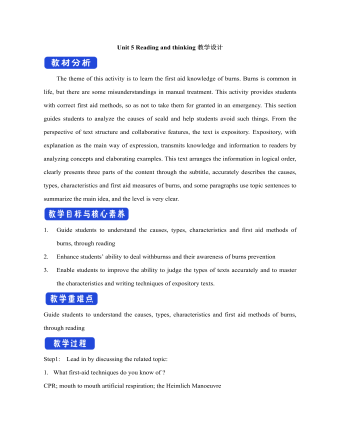
新人教版高中英语选修2Unit 5 Reading and thinking教学设计
The theme of this activity is to learn the first aid knowledge of burns. Burns is common in life, but there are some misunderstandings in manual treatment. This activity provides students with correct first aid methods, so as not to take them for granted in an emergency. This section guides students to analyze the causes of scald and help students avoid such things. From the perspective of text structure and collaborative features, the text is expository. Expository, with explanation as the main way of expression, transmits knowledge and information to readers by analyzing concepts and elaborating examples. This text arranges the information in logical order, clearly presents three parts of the content through the subtitle, accurately describes the causes, types, characteristics and first aid measures of burns, and some paragraphs use topic sentences to summarize the main idea, and the level is very clear.1. Guide students to understand the causes, types, characteristics and first aid methods of burns, through reading2. Enhance students’ ability to deal withburnss and their awareness of burns prevention3. Enable students to improve the ability to judge the types of texts accurately and to master the characteristics and writing techniques of expository texts.Guide students to understand the causes, types, characteristics and first aid methods of burns, through readingStep1: Lead in by discussing the related topic:1. What first-aid techniques do you know of ?CPR; mouth to mouth artificial respiration; the Heimlich Manoeuvre
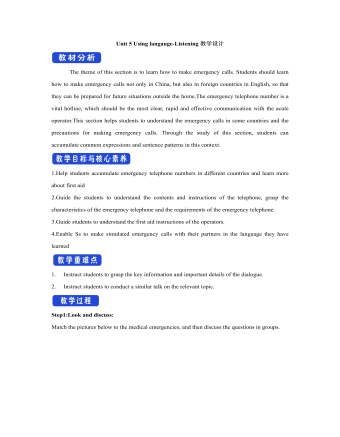
新人教版高中英语选修2Unit 5 Using langauge-Listening教学设计
The theme of this section is to learn how to make emergency calls. Students should learn how to make emergency calls not only in China, but also in foreign countries in English, so that they can be prepared for future situations outside the home.The emergency telephone number is a vital hotline, which should be the most clear, rapid and effective communication with the acute operator.This section helps students to understand the emergency calls in some countries and the precautions for making emergency calls. Through the study of this section, students can accumulate common expressions and sentence patterns in this context. 1.Help students accumulate emergency telephone numbers in different countries and learn more about first aid2.Guide the students to understand the contents and instructions of the telephone, grasp the characteristics of the emergency telephone and the requirements of the emergency telephone.3.Guide students to understand the first aid instructions of the operators.4.Enable Ss to make simulated emergency calls with their partners in the language they have learned1. Instruct students to grasp the key information and important details of the dialogue.2. Instruct students to conduct a similar talk on the relevant topic.Step1:Look and discuss:Match the pictures below to the medical emergencies, and then discuss the questions in groups.
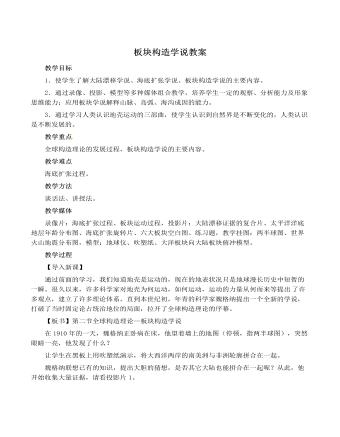
人教版高中地理选修1板块构造学说教案
【启发想象 】能否将刚才讲的内容用一个游泳动作形容一下?这好像蛙泳动作。我们大家一起做:熔岩冒出(双手合十向上)→推向两边(双手向两侧分开)→遇陆俯冲(双手往下)→重熔再生(双手相向合并向上)。【小结板书】二、海底扩张学说前面我们学习了两个假说,整理一下已知条件:事实证明大陆是在漂移的,如欧洲与美洲的距离在扩张,但是漂移的动力不足;海底是不断扩张的,有生长与消亡。能否在前人研究的基础上,提出更准确更合理的假设呢?一个新的理论诞生了,它是目前最盛行、最活跃的全球构造理论【板书】三、板块构造学说1.板块概念学生读书。【启发提问】板块“漂移”与大陆“漂移”的位置有何不同?学生回答。板块漂移是指岩石圈漂在软流层上,大陆漂移发生在地壳两层之间。【提问】板块是如何划分的?读图用半分钟记下六大板块的位置和名称(提示:按大洲和大洋名称记忆)。
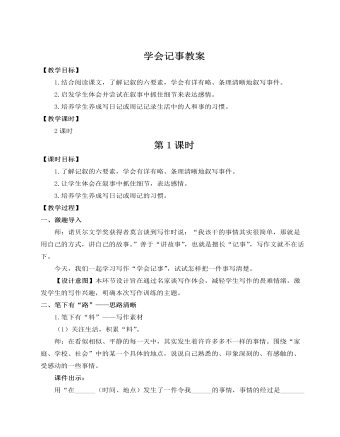
人教部编版七年级语文上册学会记事教案
家是圆心,我们都是圆内的点,爸爸、妈妈和我,我们围着圆心在走,走出一个圆满的家。(开篇点题。)清风摇曳梧桐树的小时候——(独立成段,设置场景,富有意境。)月亮又悄悄爬上了窗外的梧桐树,我靠在床头,该是听妈妈讲故事的时候了,可是妈妈又晚督班去了。妈妈是一名老师,每天兢兢业业,总有忙不完的事情。每次回家,总是带着匆匆的脚步,充斥着紧张的氛围,有时怀里还抱着几本厚厚的书。“妈妈,你不爱我了吗?为什么不在我身边?”我握住妈妈的手,她的手上还有白色的粉笔灰。“孩子……”妈妈哽住了,转过头去,眼里含着透明的水珠。她摸了摸我的头,指了指窗外的月亮:“月儿圆的时候,妈妈就会回来。”我蹦蹦跳跳跑到窗前,每个夜晚不停地寻找那圆圆的月亮——那是妈妈回来的希望。在梧桐摇曳,月儿圆圆缺缺的岁月里,充满了等待的苦涩、团聚的欢乐。
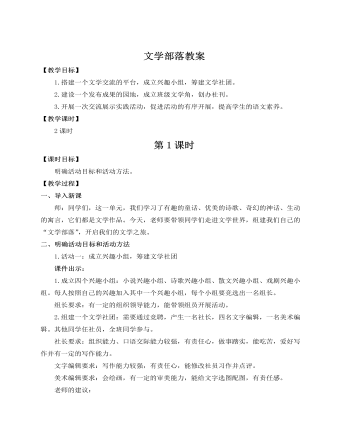
人教部编版七年级语文上册文学部落教案
四、社团报告会文学社团的社长以墙报或社刊的形成汇报文学社活动成果。汇报要求:(1)条理清楚,分享成果。(2)展示集体智慧。(3)总结交流活动经验。【设计意图】通过社长汇报,让大家深入理解墙报的策划意图、社刊的创意,分享社团活动成果,展示集体智慧,增强大家的参与热情。同时总结汇报活动经验,让每一个同学都知晓墙报的制作过程、社刊的出刊程序,有利于墙报、社刊的长久发展。五、活动结语师:“文学部落”真是美不胜收!每一朵花都散发着芬芳,每一位同学都发挥了聪明才智,每一个节目都凝聚着集体的智慧!同学们的表现非常精彩!走进“文学部落”,这里是起跑线,让我们从这里出发,走进文学的腹地!去博览群书,与高尚的人对话;去用心创作,与内在的自己交流;去精心办刊,与各样的人合作。让这些行为成为你的习惯,像滴滴露水滋养你的成长!
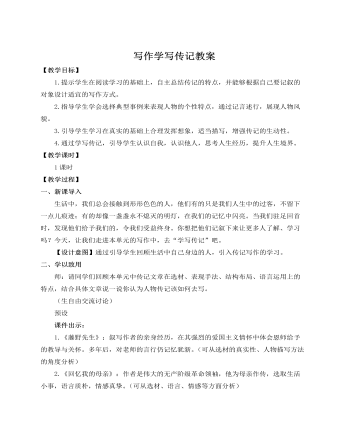
人教部编版语文八年级上册写作学写传记教案
在我到了入学年龄时,父亲为了我能够受到更好的教育,又将我和弟弟接回温州,我开始了我的读书生涯,父亲也开始了他全新的创业史。2015年,他当起了老板开始卖橱柜。为了使自己的橱柜能够做得更好,他到处去学习,读书上课都成了他的日常。他注册了“九周橱柜”的商标,做了极富特色的Logo,将“高雅品质,好而不贵”八个字定为自己企业的宣传口号。四年时间,他日思夜想的,都是如何将产品做得更加物美价廉。也正是因为他的执着与专注,他的企业很快从一家门店扩展到了五家门店,为温州千家万户安装上了崭新的橱柜。父亲今年35岁,他的身上总散发着一种向上的力量,吸引着周围的人同他一起进步。他说自己正当奋斗努力的时候,还需要不断进步。再过十年,我给他写的小传会更为精彩。我也拭目以待。
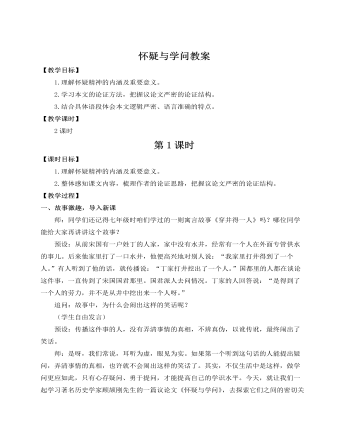
人教部编版语文九年级上册怀疑与学问教案
1.理解怀疑精神的内涵及重要意义。2.整体感知课文内容,梳理作者的论证思路,把握议论文严密的论证结构。【教学过程】一、故事激趣,导入新课师:同学们还记得七年级时咱们学过的一则寓言故事《穿井得一人》吗?哪位同学能给大家再讲讲这个故事?预设:从前宋国有一户姓丁的人家,家中没有水井,经常有一个人在外面专管供水的事儿。后来他家里打了一口水井,他便高兴地对别人说:“我家里打井得到了一个人。”有人听到了他的话,就传播说:“丁家打井挖出了一个人。”国都里的人都在谈论这件事,一直传到了宋国国君那里。国君派人去问情况。丁家的人回答说:“是得到了一个人的劳力,并不是从井中挖出来一个人呀。”追问:故事中,为什么会闹出这样的笑话呢?(学生自由发言)预设:传播这件事的人,没有弄清事情的真相,不辨真伪,以讹传讹,最终闹出了笑话。
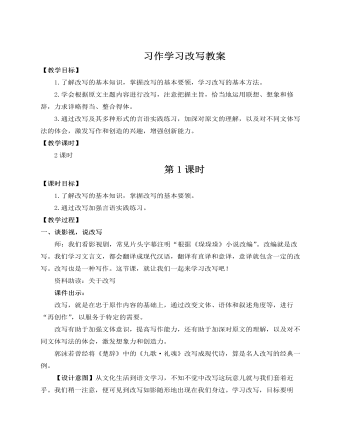
人教部编版语文九年级上册写作学习改写教案
有一天正午正走在黄泥冈上,他们又要喊歇,我自知这一带劫匪出没甚多,便催促他们快走,可他们却坐在地上不动了,任凭我怎样拿鞭抽打,他们也不起来,无奈之下,只得让他们歇会儿。不一会儿,来了一个卖酒的人过来,有人要买酒。被我阻止了,我说这酒里不知放了什么,还是不要喝的好。又一会儿来了几个贩枣的客商,先买了一桶酒,又把另一桶打开喝了一瓢。另一个客人见了,也拿瓢来舀酒。卖酒的见了,抢过瓢来,劈手将酒倒在桶里。殊不知,就在这时,蒙汗药被放进了桶里。老总管过来问我:“杨提辖,你看他们喝了都没事,我们也渴了,就买点吧。”我思量着,这一桶也被喝过,应该没事,只得同意了。于是他们便冲上去买酒,有人还给了我一瓢,我接下来喝了。这时我看他们一个个都头重脚轻栽倒在地上,心里暗叫:不好,中计了。但再想站起来,已经不可能了,看见那群“商人”,一个个笑着,我真是懊悔,没让队伍继续走,还有那些不听我话的人,为什么不听我话,又一次任务失败了,回去怎么交代……不一会儿我眼前一片漆黑,什么也不知道了。醒来后,周围一个人也没有,而生辰纲果然不见了,无奈之下,我只能逃走,却不知何处是终点……
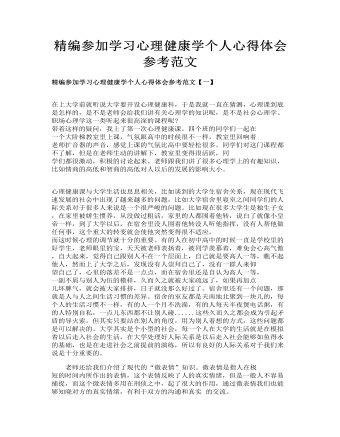
精编参加学习心理健康学个人心得体会参考范文
通过这次培训,使我进一步学会了更好的审视自己、审视身边人,更好的去观察身边人的情绪,了解身边人的心理,理解身边人的需求;心理学不但让人更好的学会面对自己,也让人更好的学会与别人相处;人无远虑必有近忧,身处这个信息高速发展的时代,工作环境变迁、身边人员流动变得习以为常,为了更好的工作,更好的与别人相处,这就要求我们必须更好的适应环境变化,了解身边不断变换的人的心理,学会更好的方式与身边人交流;人与人相处、沟通,理解是融洽相处的前提。但是这些知识从前无论生活中还是工作中都被自己有意无意的忽视了,通过几次培训中老师深入浅出的讲解,对我的帮助和触动非常大。不仅对现在,在学习过程中学到的知识和感触也会深远的影响到我的今后生活和工作。
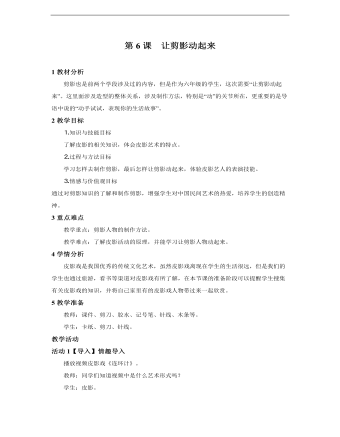
小学美术人教版六年级上册《第6课让剪影动起来》教学设计
2教学目标⒈知识与技能目标了解皮影的相关知识,体会皮影艺术的特点。⒉过程与方法目标学习怎样去制作剪影,最后怎样让剪影动起来,体验皮影艺人的表演技能。⒊情感与价值观目标通过对剪影知识的了解和制作剪影,增强学生对中国民间艺术的热爱,培养学生的创造精神。
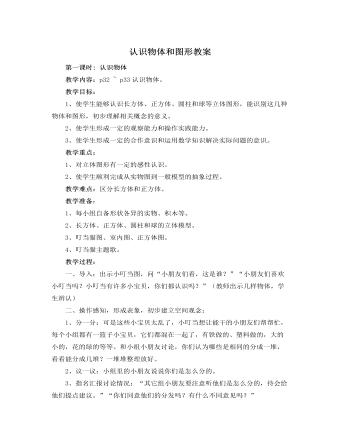
人教版新课标小学数学一年级上册认识物体和图形教案
1.让学生拿出长方体摸一摸,问:你有什么感觉?摸的的面是什么形状?师:谁来摸一摸,老师手上长方体的长方形在哪?(学生找出长方形)2.让学生在自己的学具(长方体、正方体、圆柱体)上找图形,并和小组里的同学说一说。3、指名说,教师把学生找到的图形从立体图形上分离出来,贴于黑板上,师:这些图形是物体上的一个面,这就是我们今天要认识的图形。(板书课题——认识平面图形)4.让学生说说:从什么物体上找到了什么图形?5.师:你能想办法把这些形状画到一张纸上吗?请学生演示各自不同的方法,然后教师在黑板上沿长方体的一个面画出长方形。师:你会画吗?请小朋友们用自己喜欢的办法画出并剪出长方形、正方形、圆和三角形各2个。
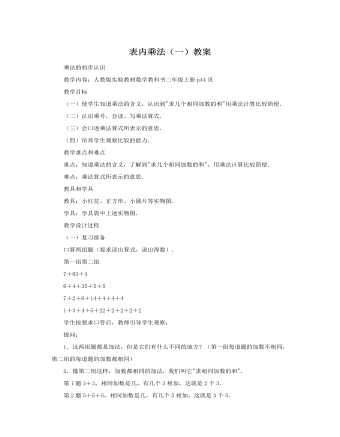
人教版新课标小学数学二年级上册表内乘法(一)教案
(6)交流。6的乘法口诀一共有几句?口诀中的第一个数与算式中的第二个因数相同,表示什么?口诀中的第二个数与算式的第一个因数相同,表示什么?相邻两句口诀的积相差几?哪几句难记一些?你用什么方法记呢?怎样记住"三六十八"、"四六二十四"两句口诀?教师在学生发言的基础上鼓励学生大胆说、想出不同记口诀的方法。(7)应用"做一做"第1题(学生半独立完成):①用6根小棒摆1个六边形;②摆2个六边形要用多少根小棒?你是怎样想的?(想口诀"二六十二"。)③运用所学的口诀口答摆4个、6个、3个、5个六边形所需要向小棒数。"做一做"第2题(独立完成):①将第2题改为填空题,在圆圈内填写正确的积;②口答得数,并说一说所用口诀。
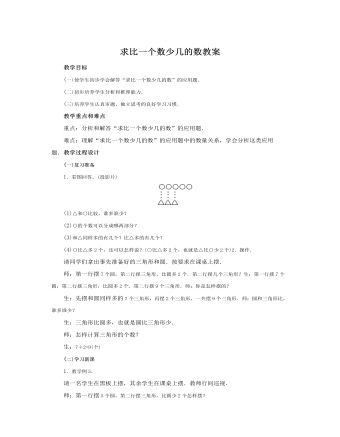
人教版新课标小学数学二年级上册求比一个数少几的数教案
课堂教学设计说明求比一个数少几的数的应用题是低年级教学的一个难点.为了分散难点,在复习准备阶段做了孕伏.如:圆比三角形多2个,也可以说三角形比圆少2个.为了突破难点,让学生动手摆、动口说、动笔写,全方位地调动学生的各种感官参与教学全过程,使学生在参与学习的活动中领悟出“求比一个数少几的数”的应用题仍然是把较大数看作两部分组成的,从大数中去掉大数比小数多的部分,就是小数与大数同样多的部分,也就是小数的数值.也可以通过“假设同样多”去透彻地理解比一个数少几的实际意义.确实使学生理解和掌握了这类应用题用减法计算的道理和解答方法.为了让学生进一步加深理解和掌握“求比一个数少几的数”的应用题的数量关系和解答方法,在巩固练习的最后设计了一组对比题目.
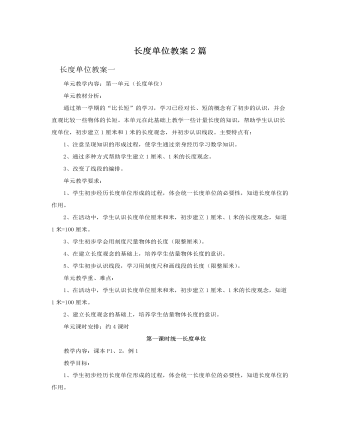
人教版新课标小学数学二年级上册长度单位教案2篇
l尺子上每相邻的两条长刻度线之间的一大格的长度都是1厘米。师:我们大家现在一起用手比划一下,1厘米多长。互相看一下,计住了吗?闭上眼睛想一想,1厘米有多长。3、认识几厘米师:我们现在知道1厘米有多长了,那3厘米又有多长呢?师:同学们还能在尺子上找到其他3厘米的长度吗?4、用厘米量师:刚才上课时,老师展示的2根线绳,到底哪一根长一点呢?现在,同学们先估计一下这两根线绳各自多长,然后在测量比较一下,好吗?师:结果是哪根线绳长一点呢?能说说你是怎么量的吗?三、知识拓展1、师:老师这里有一把尺子,可是它断了一节,没有刻度“0”,只剩下刻度3到刻度10,那么这把尺子能不能用来量物体的长度啊?同学们能不能帮老师想一想办法,好吗?2、其他测量长度的工具(课件展示)
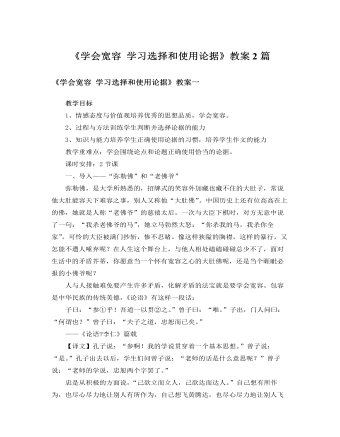
人教版高中语文必修3《学会宽容 学习选择和使用论据》教案2篇
评价分析法,就是引述事例后,对所引述的事例作适当的评价,从而使自己的观点得到印证。例如,在论“节俭”时,引用了“曾国藩以俭戒子,其子曾纪泽终成出色的外交家;方志敏居官不贪,一生清贫,千古留名”的事实后,接着进行分析:是的,“俭者心常富”,节俭能培养人同困难作斗争的勇气和意志,而这正是一个人立业最重要的素质。从这个意义上说,有人说饥饿是人生的佐料,吃苦是一种资本也不无道理,而自觉和戒奢尚俭则更是促人修身养性,磨炼意志的有效途径。这里,作者紧扣论点,对论据进行了评价性分析,这种评价分析使作者的观点得到强化。(四)因果分析法因果分析法,就是抓住论据所述的事实,并据此推求形成原因的一种分析方法。事出必有其因。我们可以依据事物发展变化的因果关系,由事物发展变化的结果,推导出产生这种结果的原因,从而揭示出一定的生活规律,使事例有力地证明观点。
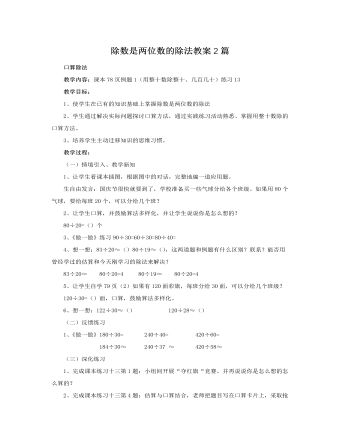
人教版新课标小学数学四年级上册除数是两位数的除法教案2篇
教学目标:1、使学生在已有的知识基础上掌握除数是两位数的除法2、学生通过解决实际问题探讨口算方法,通过实践练习活动熟悉、掌握用整十数除的口算方法。3、培养学生主动迁移知识的思维习惯。教学过程:(一)情境引入、教学新知1、让学生看课本插图,根据图中的对话,完整地编一道应用题。生自由发言:国庆节很快就要到了,学校准备买一些气球分给各个班级。如果用80个气球,要给每班20个,可以分给几个班?2、让学生口算,并鼓励算法多样化,并让学生说说你是怎么想的?80÷20=()个3、《做一做》练习90÷30=60÷30=80÷40=4、想一想:83÷20≈()80÷19≈(),这两道题和例题有什么区别?联系?能否用曾经学过的估算和今天刚学习的除法来解决?






